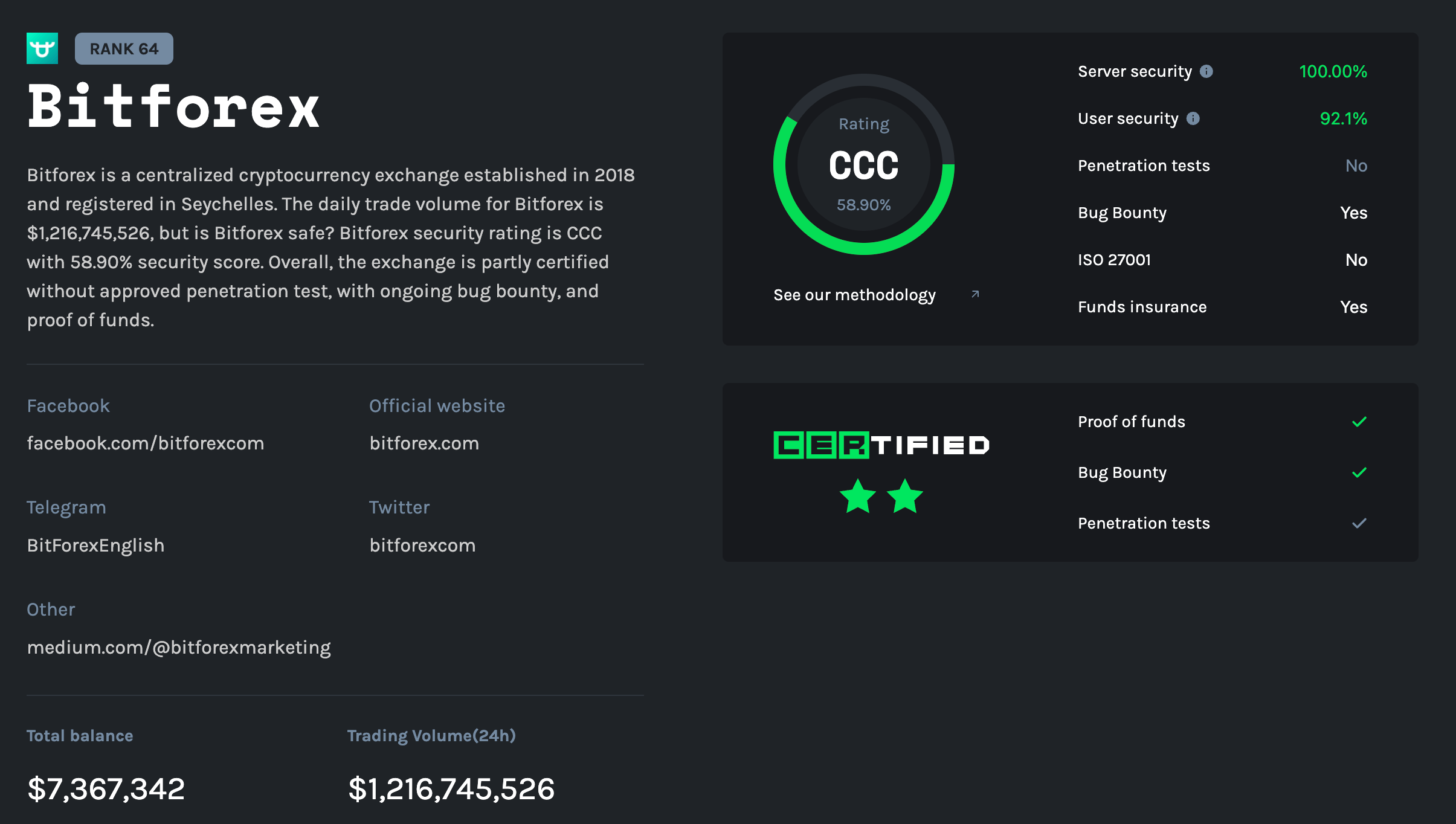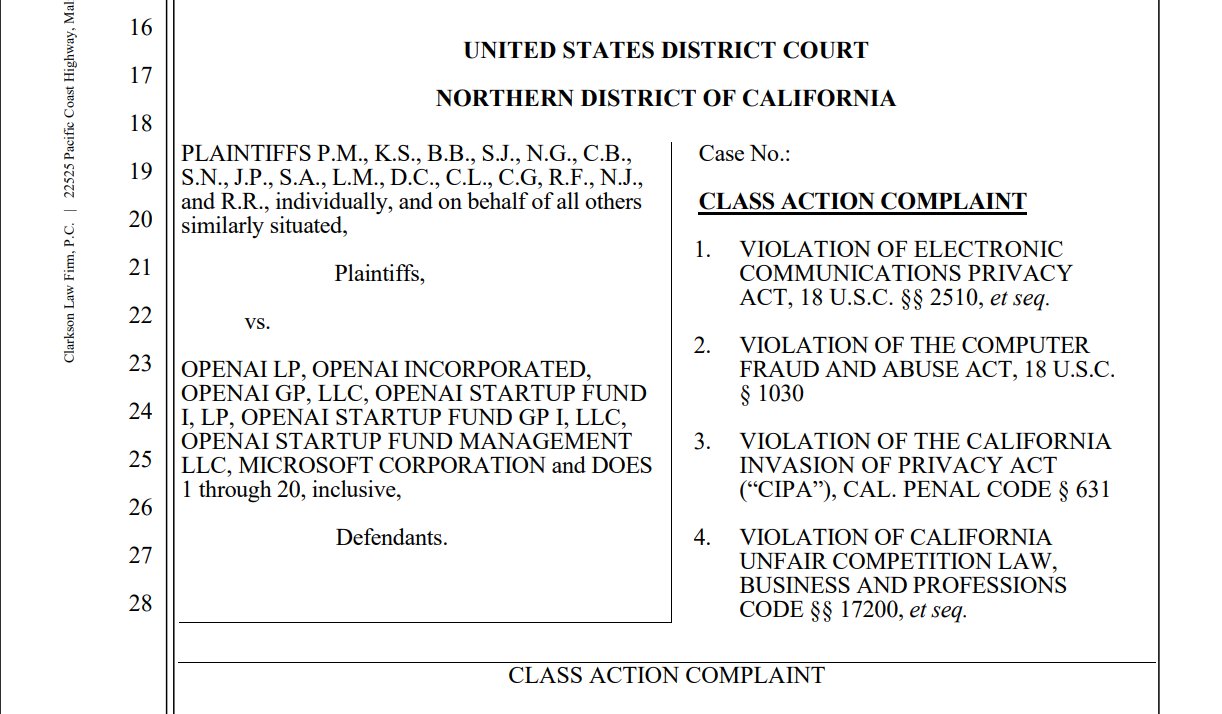 A recent research paper on SSRN by legal scholars scrutinizes the ethical quandaries and potential conflicts of interest surrounding Sullivan & Cromwell LLP’s involvement in FTX’s Chapter 11 bankruptcy filing. Study Highlights Legal Ethics From FTX Bankruptcy Proceedings The SSRN research paper entitled “Conflicting Public and Private Interests in Chapter 11” meticulously explores the controversial […]
A recent research paper on SSRN by legal scholars scrutinizes the ethical quandaries and potential conflicts of interest surrounding Sullivan & Cromwell LLP’s involvement in FTX’s Chapter 11 bankruptcy filing. Study Highlights Legal Ethics From FTX Bankruptcy Proceedings The SSRN research paper entitled “Conflicting Public and Private Interests in Chapter 11” meticulously explores the controversial […]
Source link
alleged
BitForex alleged $2.5 billion volume flatlines as exchange abruptly goes offline
Hong Kong-based crypto exchange BitForex appears to have gone entirely dark following the suspension of its website and trading application on Feb 23. Users have been unable to initiate withdrawals or access the exchange for several days, which boasted over $2 billion in trading volume as recently as Feb 24.
Data from CoinGecko shows trading volume decreasing from $2.5 billion to $1 billion between Feb 22 and Feb 24 before flatlining. However, normalized data suggests the exchange may have inflated its volumes by up to 100 times. The normalized data is where “web traffic statistics are considered when considering the trading volume,” which was reported at just $25 million for Feb 22.

On Feb 23, crypto investigator ZachXBT reported outflows of approximately $56.5 million from BitForex’s hot wallets. Withdrawals subsequently ceased without official communication from the exchange. Further analysis of Bitforex’s holdings raises flags. The exchange possesses a significant portion of TRB and OMI token supplies, specifically 18% of TRB and 7% of OMI.
As users seek answers via platforms like Telegram, the timing of the company’s CEO stepping down a month ago raises additional suspicion. On Jan 31, CEO Jason Luo stated,
“Today, I have decided to step down from the position of CEO, but my heart remains deeply rooted in the BitForex family. A new leadership team is poised to take the reins, and I believe they will guide BitForex towards even greater horizons. I will continue contributing my wisdom and strength to BitForex because this is my eternal commitment to this home.”
The abrupt leadership change at BitForex, in conjunction with the recent events, now casts extreme doubt on the company’s stability.
On-chain activity for the exchange’s native BF token has been limited, with roughly $2,000 moved within the past 11 days. The last update to CoinmarketCap’s data for the exchange was over 65 hours ago, showing around $280 and $175 million in Ethereum and Bitcoin trading volume, respectively.
The exchange’s X account has had no activity since Feb 21, when it posted, “What are the top encryption projects in 2024?🤔.”
A security ‘CCC’ rating by Certified suggests the exchange had an insurance policy, but no specific details are available.

The company’s official Telegram channel continues to run without any activity from admins. One admin, referred to as Hazel_BitForex, has deleted their account. Other admins have not replied to any posts since at least Feb 21 as of press time. The group, with 23,413 members, currently has over 1,000 users online awaiting a response from the exchange.
Data available at this stage suggests a dark reality for BitForex users. The lack of communication across several platforms, such as its website, X, and Telegram accounts, means users with funds stuck on the exchange may have just reason to worry.
Empty bottles: Alleged mastermind of $100 million wine fraud extradited to U.S.

These wines didn’t age well.
The alleged mastermind behind a fine-wine investment strategy prosecutors say was actually a $100 million Ponzi scheme has been extradited to the United States to face criminal charges.
Stephen Burton, 58, of the United Kingdom, was flown to New York from Morocco on Friday to be arraigned on charges of money laundering and wire fraud for a yearslong scheme that allegedly involved providing high-yield loans backed by ultra-high-priced wines that didn’t exist.
Burton, who had used the aliases Andrew Pittman, Robert Allison and Derek Campbell, was arrested in Morocco in 2022 after entering the country on a phony Zimbabwean passport. His co-defendant, James Wellesley, 56, was arrested around the same time in the U.K. and has been awaiting extradition from there since.
“[Burton] will now taste justice for the fine wines scheme alleged in the indictment,” said Breon Peace, the U.S. attorney for the eastern district of New York. “This prosecution sends a message to all perpetrators of global fraud that you can run from law enforcement, but not forever.”
Messages left with attorneys for Burton and Wellesley weren’t immediately returned.
Prosecutors say that from 2017 through 2019, Burton was the chief executive of Bordeaux Cellars, an investment scheme based in the U.K. and Hong Kong that pooled money for high-yield lending to people who had high-priced wine as collateral. Over the years, the men said they had amassed a cache of high-priced bottles of wine worth millions in a storage facility in London.
According to court filings, Burton and Wellesely would approach wine connoisseurs at investor conferences and sales shows and pitch them the scheme which they said would yield 12% interest by lending to high-net-worth individuals who needed quick access to cash.
They claimed that they would only lend up to 35% of the value of the millions of dollars worth of wine held in storage and that if borrowers defaulted, they would just sell the wine so investors would never lose their money. The pair claimed they had lent out $152 million in such loans over the course of six years.
But investigators say Bordeaux Cellars never held much of the wine it claimed to own and that most of the money they took in was used to pay out earlier investors and to finance their own lifestyles.
In all, prosecutors say the scheme took in $99.4 million in investments, and that $8.2 million of it went missing when the scheme collapsed in February 2019.
Many of the hundreds of alleged victims were in England but others were in the United States, prosecutors said.
When Burton was initially arrested in England in 2019, investigators say they found nine kilograms of gold ingots and coins, expensive watches, banking cards, more than 500 lottery tickets, more than £53,000 and €14,000 in cash and false identification documents.
Burton was later released from jail in 2020 due to Covid-19 concerns but then allegedly fled the U.K. using the false Zimbabwean passport, officials said.
Crypto community questions Strike’s reported denial of alleged security breach

What is CryptoSlate Alpha?
A web3 membership designed to empower you with cutting-edge insights and knowledge. Learn more ›
Connected to Alpha
Welcome! 👋 You are connected to CryptoSlate Alpha. To manage your wallet connection, click the button below.
Oops…you must lock a minimum of 20,000 ACS
If you don’t have enough, buy ACS on the following exchanges:
Connect via Access Protocol
Access Protocol is a web3 monetization paywall. When users stake ACS, they can access paywalled content. Learn more ›
Disclaimer: By choosing to lock your ACS tokens with CryptoSlate, you accept and recognize that you will be bound by the terms and conditions of your third-party digital wallet provider, as well as any applicable terms and conditions of the Access Foundation. CryptoSlate shall have no responsibility or liability with regard to the provision, access, use, locking, security, integrity, value, or legal status of your ACS Tokens or your digital wallet, including any losses associated with your ACS tokens. It is solely your responsibility to assume the risks associated with locking your ACS tokens with CryptoSlate. For more information, visit our terms page.
Sweetgreen sued by New York workers for alleged racial discrimination
Workers prepare apples and avocados inside a Sweetgreen Inc. restaurant.
Adam Glanzman | Bloomberg | Getty Images
Ten Sweetgreen employees are suing the salad chain, alleging racial discrimination at seven of its New York City restaurants.
The lawsuit, filed Thursday in New York Supreme Court in the Bronx, alleges that the plaintiffs’ co-workers and managers subjected them to daily use of the N-word and other racist comments.
The complaint also alleges that managers failed to hire or promote qualified Black employees and gave preferential treatment to Hispanic workers. The plaintiffs allege that store managers said Hispanic people work harder than African Americans and called Black employees lazy.
The plaintiffs also claim complaints to upper management, including Sweetgreen’s human resources department, were ignored for years.
The lawsuit claims managers sexually harassed female workers, making sexual comments and touching them inappropriately.
“At Sweetgreen, we are committed to diversity as well as a safe and inclusive workplace. We take these accusations seriously and do not tolerate any form of harassment, discrimination, or unsafe working conditions,” a Sweetgreen spokesperson said in a statement to CNBC.
The spokesperson said the company was unable to comment further on pending legal matters.
The plaintiffs are seeking monetary and punitive damages and payment of attorneys’ fees.
The lawsuit was originally filed in March with only two plaintiffs. Thursday’s amended complaint includes eight new plaintiffs and adds more restaurants.
The seven Manhattan locations named in the lawsuit include restaurants in the Meatpacking District, the Financial District, Greenwich Village, Midtown East, the Upper East Side and the Upper West Side.
Companies are liable for their managers’ discriminatory conduct under New York City law.
The lawsuit also names two of Sweetgreen’s “head coaches,” or general managers, as defendants.
Ronaldinho denies part in alleged $61M crypto scam at congressional hearing
Retired pro soccer star Ronaldinho Gaúcho has testified at a congressional hearing in Brazil, denying his involvement in an alleged $61 million crypto pyramid scheme that bore his name.
On Aug. 31 Ronaldinho appeared before a parliamentary committee inquiry where he refuted any role in the scheme called “18kRonaldinho” that promised 2% daily returns on crypto. A lawsuit was filed against the firm, seeking $61 million in damages.
Ronaldinho claimed he was never partnered with the company, and it used his name and image without his authorization, arguing he was also a victim of the purported scheme.
During the hearing, images were shown of 18kRonaldinho’s marketing that depicted Ronaldinho.

He said the pictures were taken as part of a contract he signed in July 2019 with a subsidiary of the company that sells watches but that contract was terminated later that year in October and was never executed.
The inquiry’s president, Aureo Ribeiro,asked Ronaldinho if he intended to reimburse those who invested in the company, to which Ronaldinho said he would remain silent.
He also did not answer when asked about the $61 million lawsuit.
Related: Breaking victim ‘trust’ in scammer is key to beat crypto scams, exchanges say
Ronaldinho had failed to appear before two previous hearings related to the inquiry, most recently on Aug. 24. He said weather conditions meant he was not able to attend.
The latest Aug. 31 hearing was his last chance to appear before Congress — if he didn’t, Ronaldinho faced possible fines or arrest in which authorities would’ve forcibly taken him to appear at the hearing.
The inquiry was launched in June to investigate purported crypto pyramid schemes and is being carried out by Brazil’s lower house, the Chamber of Deputies.
It’s investigating a total of 11 companies alleged by the country’s Securities and Exchange Commission to have falsely promised high returns using crypto.
Collect this article as an NFT to preserve this moment in history and show your support for independent journalism in the crypto space.
Magazine: Tornado Cash 2.0 — The race to build safe and legal coin mixers
ChatGPT maker OpenAI hit with class-action lawsuit over alleged data theft
OpenAI, the maker of the popular chatbot ChatGPT — a natural language processing artificial intelligence (AI) tool — is facing a class-action lawsuit in California over allegedly scraping private user information from the internet.
The lawsuit was filed in the United States District Court for the Northern District of California by Clarkson Law Firm on June 28. The suit alleges that OpenAI trained ChatGPT using data collected from millions of social media comments, blog posts, Wikipedia articles and family recipes without the consent of the respective users. Thus, OpenAI violated the copyrights and privacy of millions of internet users.

The 16 named plaintiffs in the case claim OpenAI illegally accessed private information from individuals’ interactions with ChatGPT. If these allegations are proven to be accurate, the accused will be in breach of the Computer Fraud and Abuse Act — a law with a precedent for web-scraping cases. Microsoft, a major OpenAI investor, was also named a defendant. OpenAI did not respond to Cointelegraph’s requests for comments by publication.
The lawsuit also alleges that OpenAI products “use stolen private information, including personally identifiable information, from hundreds of millions of internet users, including children of all ages, without their informed consent or knowledge.”
“By collecting previously obscure personal data of millions and misappropriating it to develop a volatile, untested technology, OpenAI put everyone in a zone of risk that is incalculable – but unacceptable by any measure of responsible data protection and use,” Clarkson said.
AI technology has gained a lot of traction over the past year due to the massive popularity of ChatGPT. The rise of AI has also nudged governments worldwide to take notice, with the likes of the U.S. and the European Union already proposing legislation to regulate the nascent industry.
Related: US vice president gathers top tech CEOs to discuss dangers of AI
On June 20, a bipartisan set of U.S. lawmakers introduced the National AI Commission Act, which would establish a commission to study the country’s approach toward AI. Similarly, the European Parliament passed the Artificial Intelligence Act in the second week of June. The legislation would establish a framework for governance and oversight of the AI industry in the EU.
Magazine: Musk’s alleged price manipulation, the Satoshi AI chatbot and more
Mango Markets exploiter behind alleged $116M theft will stand trial in December

The criminal case against the crypto user allegedly behind a multimillion-dollar exploit of decentralized exchange Mango Markets will be moving forward in the United States, with a trial scheduled for Dec. 4.
According to court records filed on June 14, Judge Richard Berman of the U.S. District Court for the Southern District of New York set Avraham Eisenberg’s trial date for Dec. 4. Eisenberg was allegedly responsible for executing a major Mango Markets exploit in October 2022, resulting in the theft of roughly $116 million in governance token MNGO, USD Coin (USDC) and Marinade Staked SOL (mSOL).
Eisenberg has pleaded not guilty to three criminal counts for commodities fraud, commodity manipulation and wire fraud related to the Mango Markets exploit. The platform reported in October 2022 that he had returned roughly $67 million of the funds, with the crypto user claiming at the time that his actions had been legal as part of a “highly profitable trading strategy.”
Related: Mango Markets sues Avraham Eisenberg for $47M in damages plus interest
Lawyers with the U.S. Attorney’s Office and Eisenberg’s defense team have until June 22 to submit pretrial motions regarding the schedule. He also faces separate civil suits filed in January by the Commodity Futures Trading Commission, Securities and Exchange Commission and Mango Markets.
The alleged Mango Markets exploiter has not posted to his Twitter account since authorities arrested him in Puerto Rico in December 2022 and transferred him to Oklahoma. He has largely been held in U.S. custody following a February hearing in which he waived his right to bail.
Magazine: Should crypto projects ever negotiate with hackers? Probably








